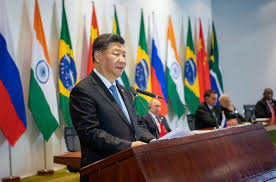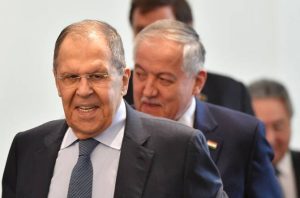Xi’s proposals to strengthen BRICS cooperation boost world confidence

Brasilia: The 11th summit of BRICS held in the capital of Brazil from Wednesday to Thursday has captured global attention.
Amid rising protectionism and unilateralism and greater governance deficit, the BRICS summit serves to fan the tailwinds of free trade and multilateralism, as well as stronger cooperation and unity among BRICS members, so as to boost economic growth in an innovative way.
At the summit, Chinese President Xi Jinping called on the BRICS countries to champion multilateralism and strengthen cooperation to build a community with a shared future for mankind, which was echoed by analysts and observers worldwide.
As the rise of unilateralism and trade protectionism has exacerbated the global situation, Xi said at the plenary session of the summit on Thursday that the BRICS countries need to champion and put into practice multilateralism.
The BRICS countries need to stand firm against protectionism, uphold the WTO-centered multilateral trading system, and increase the voice and influence of emerging markets and developing countries in international affairs, Xi said.
Stressing the importance of multilateralism and international institutions, Brazilian political analyst Mauricio Santoro said they provide “a consensus-driven, rules-based environment for cooperation and trade,” and the BRICS bloc of emerging economies carries great global weight as a champion of multilateralism and against protectionism.
Ligia Costa, a professor at the School of Business Administration of the Getulio Vargas Foundation (FGV) in Sao Paulo, said “I do agree with President Xi’s vision of embracing multilateralism.”
“Supporting multilateralism and upholding the multilateral trading system is the best option available for the safety of a sustainable economic system which is necessary for the current generation and the next generations to come,” she said.
The BRICS should try to influence structural changes within the existing multilateral trading system, and promote governance and inclusiveness, Costa added.
Oliver Stuenkel, an associate professor of international relations at the FGV, said the BRICS plays a crucial role in fighting against the wave of protectionism that is taking place particularly in the West.
“It is important for the BRICS countries to reiterate their commitment to defend globalization, to continually keep borders open,” Stuenkel said.
Luis Antonio Paulino, a professor at the Faculty of Philosophy and Sciences in Sao Paulo State University, said the BRICS countries “need to act in a coordinated way around the world, especially to defend the multilateral trading system and promote changes in global governance that make the world more open and fair.”
Tom Watkins, an advisor to the nonprofit organization Michigan-China Innovation Center, said Xi reminded people that the world is “a better place when we build bridges to connect the world and not spend our time building walls or digging moats.”
“Every nation needs to take a broad view of the world,” Watkins added.
The past 10 years are dubbed a “golden decade” for BRICS, as cooperation among the members has boosted their growth, contributing greatly to the world economy and peoples’ well-being.
At the closing ceremony of the BRICS business forum on Wednesday, Xi pointed out new opportunities for growth, saying the power unleashed by a new round of technological revolution and industrial transformation has opened up new ground for productivity growth, and economic and social development.
On Thursday, Xi urged BRICS countries to pursue greater development prospects through openness and innovation.
“We need to deepen the BRICS Partnership on New Industrial Revolution, and strive for more productive cooperation in such fields as trade and investment, digital economy, and connectivity,” Xi said.
Adhere Cavince, a Kenyan international relations expert with a focus on China-Africa relations, said Xi further elevated the role of business and technological advances in creating global public goods that can be tapped to improve livelihoods across the world.
“By pushing for the industrial revolution, BRICS aims to harness the very wisdom that propped and continue to anchor China’s socio-economic transformation. Its success will certainly be a win for all member states and organizations,” Cavince said.
Looking into cooperation in the future, Paulino said that windows of opportunity open up every time a new wave of technological innovation comes along. “In fact, what counts is the ability to implement these new technologies,” the scholar said.
Santoro said the challenge facing BRICS countries is “how can they continue to work together, to respond to the current scenario … and continue to change and adapt to the changing circumstances.”
Development of the BRICS offers abundant opportunities for the world to strive for common growth. With the highest gross domestic product among all BRICS members, China is a critical driving force of the bloc’s growth and source of development opportunities for others, analysts said.
The observation echoed Xi’s remarks at the closing ceremony of the BRICS business forum on Wednesday. Xi said the forum that China’s development is an opportunity for the world and China’s commitment to opening up more widely and the long-term positive trend of its economy have not changed.
The joint building of the Belt and Road has entered a new high-quality period, Xi said, calling on the entrepreneurs to seize the opportunity and actively participate to reap more fruits of cooperation.
According to Santoro, Brazil’s Investment Partnership Program, a scheme promoted by Brazilian President Jair Bolsonaro to attract foreign investment, “fits in perfectly” with the China-proposed Belt and Road Initiative (BRI).
The project and the BRI “have many points in common, especially their clear emphasis on infrastructure as key to resuming global development,” Santoro said.
On a regional scale, Santoro said China has become an important partner in terms for Latin America’s infrastructure building, from highways, railways to solar parks and wind farms.
Argentine political analyst Lautaro Taibo noted China’s domestic and foreign policies are “examples of a new form of cooperation that seeks to reduce social disparity by fighting poverty at home and spurring growth around the globe” with schemes such as the BRI.
“As the world’s largest developing economy, China’s role is critical not only for the development of BRICS members, but for all developing countries. The Belt and Road proposal opens a new path for world development based on mutual cooperation and respect for each country’s autonomy,” Paulino said. ■





